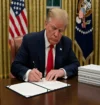U.S. Court Pauses Ruling Against Trump’s Tariff; White House Plans Supreme Court Appeal
A U.S. appeals court has temporarily paused a recent ruling that had blocked Trump’s tariff policy. This means that Trump’s tariff plan will stay in effect for now while the legal battle continues. Should the need arise, the White House has signaled it will pursue the lawsuit to the Supreme Court.
What is Trump’s Tariff?
The Trump tariff refers to a set of import taxes introduced by former President Donald Trump. In his strategy, Trump hopes the tariffs will help lessen America’s purchases from other countries and also serve as a form of punishment for those he analysts as breaking trade laws.
The current version of the tariff was justified under a law called the International Emergency Economic Powers Act (IEEPA), which is normally used in times of national emergency.
Trump said the law allowed him to find that certain items from other countries were involved in drug trafficking and harmed the economy of the United States. Critics argue that Trump’s tariff goes too far and that the president is using powers he doesn’t actually have under the law.
Legal Battle Over Trump’s Tariff
A group of U.S. states and small business associations challenged Trump’s tariff in court. The companies claimed that the policy was against the law and hurt the nation’s economy. On May 28, a federal court agreed with them and ruled that Trump’s tariff was invalid.
Congress must give clearer rules before the president can use the IEEPA to guide trade policy, according to the court. That ruling could have ended Trump’s tariff, but the government quickly appealed.
An Appeals Court is now Concerned
The earlier ruling was put on hold by the appeals court on May 29. This means Trump’s tariff will remain in place while the appeal moves forward. The judge estimated that the case would move ahead swiftly. The states and business groups challenging Trump’s tariff must file their arguments by June 5. Government officials have until June 9 to answer the committee.
White House’s Stance and Supreme Court Prospects
Nothing has been said so far about the letter from the White House.
The Biden administration has defended tariffs, saying it is important for national security and to protect American jobs. Officials in the White House have said they believe the lower court put forth an incorrect decision and are ready to raise the issue before the U.S. Supreme Court should the appeals court disagree.
They argue that presidents have long used emergency powers for trade issues, and tariffs are not different.
Results for Markets and Businesses
News from Ukraine has caused the market to go up and down. Those businesses that trade goods across borders are most worried. Many companies had already adjusted to Trump’s tariff policies, and a sudden change would force them to redo contracts and shipping routes.
Billionaires and investors are interested in what’s going on. The temporary pause in the court ruling gives businesses more time to prepare, but the bigger issue- whether Trump’s tariff is legal-still hangs in the balance.
What’s the Outcome?
For now, Trump’s tariff stays active. In June, the appeals court will look at the arguments and a ruling may be issued not long afterward. If a court makes a decision which believes affects your rights, you are expected to file an appeal at the U.S. Supreme Court.
If that happens, the future of tariffs will likely be decided later this year or early next year. Until then, importers, exporters, and consumers will have to deal with the uncertainty surrounding Trump’s tariffs.
Conclusion
The legal fight over Trump’s tariff is far from over. For now, the court’s short freeze allows the White House to work on its defense, though final judgment will come from higher courts.
Because the deal will involve vast amounts of money and thousands of jobs, there is much at risk. Whether Trump’s tariff will survive or be struck down is a question only the courts- and possibly the Supreme Court- gbcan answer.



